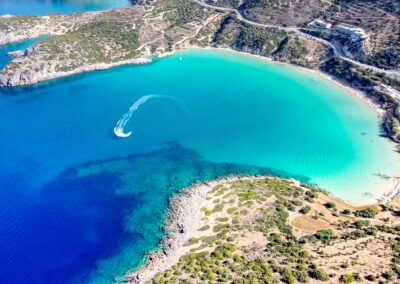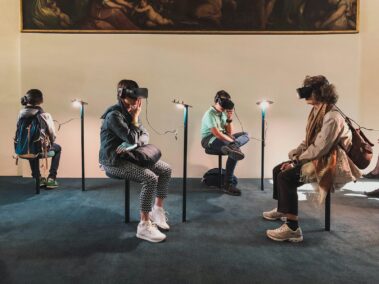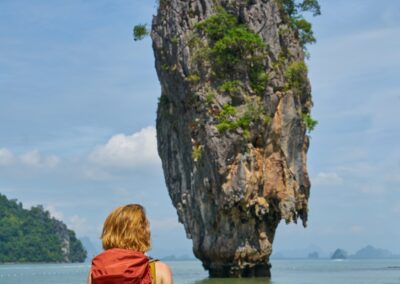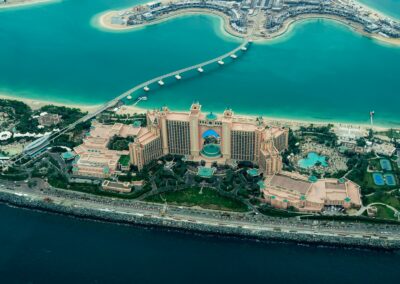Promoting Eco-Friendly Travel Through Augmented Reality
The Role of AR in Enhancing Sustainable Tourism
AR for sustainable tourism is emerging as a powerful tool to promote eco-friendly travel and responsible tourism practices. Augmented Reality (AR) overlays digital information onto the physical world, providing travelers with immersive and interactive experiences that enhance their understanding and appreciation of the destinations they visit. By leveraging AR, the tourism industry can offer more informative and engaging travel experiences while encouraging tourists to make environmentally conscious decisions.
In regions like Saudi Arabia, the UAE, Riyadh, and Dubai, where tourism is a key economic sector, AR technology can play a significant role in promoting sustainability. AR travel guides can provide real-time information about local wildlife, cultural heritage, and conservation efforts, helping tourists understand the impact of their activities on the environment. For example, an AR app can highlight eco-friendly accommodations, suggest low-impact activities, and offer tips on reducing waste and conserving resources.
Moreover, AR can help mitigate the negative effects of mass tourism by directing visitors to lesser-known attractions and off-the-beaten-path destinations. This not only alleviates pressure on popular sites but also spreads economic benefits more evenly across different regions. By promoting sustainable tourism practices, AR can contribute to preserving natural and cultural resources for future generations, ensuring that tourism remains a viable and positive force in the economy.
Key Features of AR for Eco-Friendly Travel
The effectiveness of AR for sustainable tourism lies in its ability to provide comprehensive and context-sensitive information to travelers. One of the key features is real-time data on environmental conditions, such as air quality, weather forecasts, and wildlife activity. This information can help tourists plan their activities in a way that minimizes ecological disruption and ensures their safety.
Another essential feature is the integration of cultural and historical information. AR travel guides can enrich the visitor experience by providing augmented tours of historical sites, museums, and cultural landmarks. By offering detailed narratives and interactive elements, these guides can foster a deeper understanding and appreciation of local heritage. This educational aspect is vital for promoting responsible tourism, as it encourages travelers to respect and preserve the places they visit.
Additionally, AR travel guides can incorporate gamification elements to engage users and promote sustainable behavior. For example, travelers can earn rewards for participating in eco-friendly activities, such as recycling, using public transportation, or supporting local conservation projects. These incentives can motivate tourists to adopt more sustainable practices and contribute positively to the destinations they visit.
Integrating Emerging Technologies for Enhanced Sustainability
The potential of AR for sustainable tourism can be significantly enhanced by integrating emerging technologies such as Artificial Intelligence (AI), Blockchain, and the Metaverse. AI can analyze vast amounts of data to provide personalized recommendations that align with each traveler’s preferences and sustainability goals. For example, AI algorithms can suggest eco-friendly travel routes, identify green-certified businesses, and tailor itineraries to reduce carbon footprints.
Blockchain technology offers transparency and security in the travel industry by enabling the verification of sustainability claims. With Blockchain, travelers can ensure that the eco-friendly practices of accommodations and tour operators are genuine. This technology can also facilitate secure and traceable transactions, enhancing trust and accountability in the tourism sector.
The Metaverse presents opportunities for virtual travel experiences that can complement physical journeys. By offering virtual tours of sensitive ecological sites or cultural heritage areas, the Metaverse can reduce the impact of tourism on fragile environments while still providing enriching experiences. Travelers can explore virtual replicas of destinations before visiting in person, allowing them to make more informed and sustainable travel choices.
Leadership and Strategic Planning for Sustainable Tourism
Promoting AR for sustainable tourism requires effective leadership and strategic planning. Business executives and entrepreneurs in the tourism sector must prioritize sustainability in their organizational goals and invest in the development of AR technology. This involves collaborating with technology providers, environmental organizations, and local communities to create comprehensive and impactful AR travel guides.
Leadership in sustainable tourism also entails fostering a culture of innovation and continuous improvement. By staying abreast of technological advancements and evolving consumer preferences, tourism businesses can adapt and enhance their offerings to meet the growing demand for eco-friendly travel experiences. Executive coaching services can support leaders in developing the skills and knowledge necessary to drive these initiatives and foster a sustainability-focused organizational culture.
Strategic planning should include regular assessments of environmental impact and the effectiveness of sustainability measures. By setting clear goals and benchmarks, organizations can track their progress and make data-driven decisions to improve their sustainability practices. Engaging with stakeholders, including tourists, local communities, and environmental experts, is crucial for gaining insights and feedback that can inform and refine sustainability strategies.
Conclusion: Embracing the Future of Sustainable Tourism with AR
The integration of AR for sustainable tourism represents a significant step forward in promoting responsible and eco-friendly travel practices. By leveraging AR technology and emerging innovations such as AI, Blockchain, and the Metaverse, the tourism industry can offer more immersive, educational, and sustainable experiences. For regions like Saudi Arabia, the UAE, Riyadh, and Dubai, adopting these technologies can enhance their appeal as sustainable travel destinations and contribute to long-term environmental conservation.
Effective leadership and strategic planning are essential for realizing the full potential of AR in promoting sustainable tourism. By prioritizing sustainability, investing in innovative technologies, and engaging with stakeholders, businesses can create impactful travel experiences that benefit both tourists and the environment. The future of tourism lies in embracing digital innovations that promote responsible travel, ensuring that the beauty and heritage of destinations are preserved for generations to come.
#ARForSustainableTourism #EcoFriendlyTravel #ResponsibleTourism #AugmentedReality #SaudiArabia #UAE























